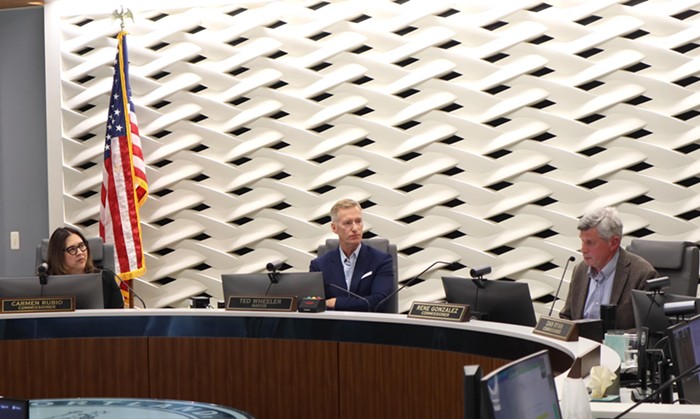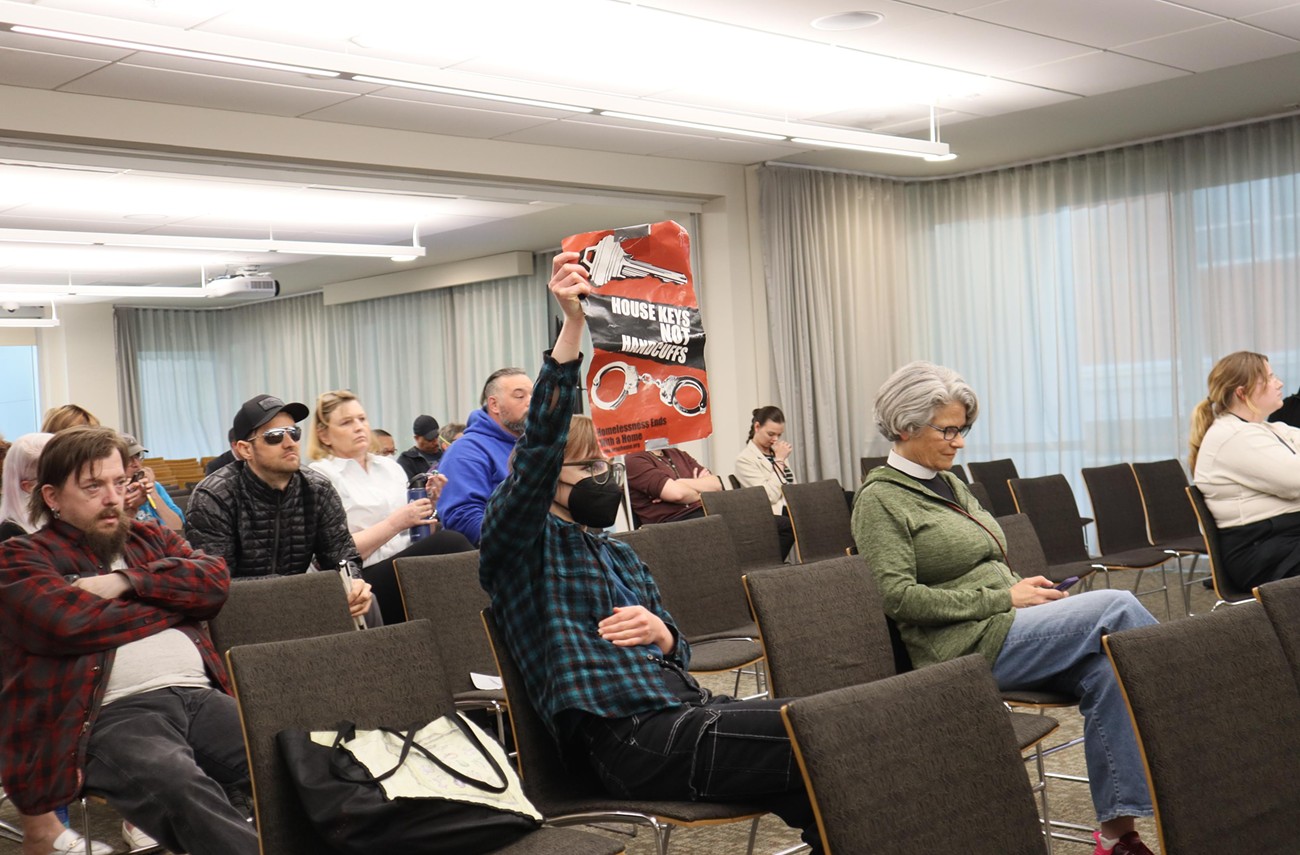After a series of proposed changes and late-stage amendments, Portland City Council is on track to relax its city codes regulating houselessness.
The Council took an initial vote Wednesday to approve amendments to a revamped public camping ordinance put forward by Mayor Ted Wheeler, with changes from Commissioners Carmen Rubio and Mingus Mapps.
The new ordinance, which still requires a final council vote, replaces city code adopted last June that was met with a lawsuit and subsequent court injunction, preventing it from ever going into effect.
Portland’s new regulations:
- Clarify the definition of camping;
- Prohibit anyone from camping in public if they have access to reasonable shelter, or if they decline an offer of shelter;
- Prohibit camping in public right-of-ways like sidewalks;
- Specifically call out bike accumulation and assembly; fires, camp stoves, and any erected or makeshift structures near a campsite as illegal;
- Impose fines of up to $100 or seven days in jail for non-compliance, with a provision encouraging diversion and services before resorting to criminal or civil penalties
Unlike the ordinance adopted in 2023, the new policies don’t restrict what time of day a person may rest or camp, and the new rules will hinge on the availability of enough shelter beds.
A day before the council was scheduled to consider the policy revisions, Wheeler and the city’s attorney took media questions during a virtual briefing. Wheeler and city staff laid out the legal parameters the city must consider, and the changes the mayor’s revised ordinance would implement. Current Oregon law dictates that any regulations related to unhoused residents must be “objectively reasonable” with regard to the time, place, and manner of the rules for resting or camping.
Wheeler asserts his proposal allows for enforcement of stringent camping rules, while addressing the issues in the city’s previous ordinance that led to a legal challenge and a court injunction.
The mayor also lobbed thinly veiled jabs at amendments put forward by Commissioner Rene Gonzalez, insinuating they wouldn’t pass legal muster.
Gonzalez’s proposal sought to transfer all decision making and future changes to city camping code to the mayor, rather than the full city council. The commissioner said he was trying to align the city’s policy with what Gresham does. Others noted Gresham’s approach, which gives responsibility and discretion for clearing encampments to the city manager, is already in line with what Portland does via the city’s Impact Reduction Team.
Gonzalez, who is running for mayor in November, also sought much tougher restrictions, including an outright ban on all camping in public, regardless of whether adequate shelter exists. Wheeler and attorney Robert Taylor said any ordinance adopted by the city must be contingent on the availability of enough shelter beds to serve the city’s unhoused population, in order to be legally sound.
“I’m not sure, frankly, that some of these proposals have been vetted with those who are responsible for implementing, prosecuting, or working with the people who are impacted by these ordinances,” Wheeler told reporters during Tuesday’s media briefing.
In all, three city commissioners–Gonzalez, Rubio, and Mapps– requested amendments to the heavily revised ordinance put forward by the mayor in early April.

listen as Commissioner Rene Gonzalez responds to questions during
a hearing on the city's public camping regulations. courtney vaughn
Some were small. In a move aimed at increasing transparency and accountability, Commissioner Rubio suggested the city’s new ordinance should require police to record data about the number and frequency of arrests, as well as demographics, for any arrests or citations regarding the camping codes, and make quarterly reports available to the public. Rubio said adding that requirement would “ensure it is not being disproportionally enforced.”
Commissioner Mapps wants to see the city create a new Public Environment executive team, staffed by the mayor and city administrators, to review and develop policy proposals for “programs and services related to homelessness and unsanctioned public camping.” The executive team will regularly report any legal or policy developments related to homelessness, and propose code changes when necessary, which the mayor can then bring to council for consideration.
Commissioner Gonzalez’s proposed changes were less minor amendments, and more substantial rewrites, with the elements changing three times before Wednesday afternoon’s council discussion and public hearing.
Gonzalez’s final and third set of amendments weren't submitted into the record until a few hours before the council’s afternoon discussion and public hearing. At the onset of the afternoon hearing, no one on the Council had seen his requested changes.
After waffling on what fines and criminal penalties to propose, Gonzalez's late-day revisions suggested no jail time, but fines of up to $1,000 for unhoused residents who violate the new rules.
Some of the rules laid out in Gonzalez's proposal would require state and federal laws around homeless regulations to be overturned.
"For the city of Portland, it's particularly important that we say 'no' to public camping," Gonzalez said. "If we don't, we will continue to attract the transitory ... aspects of the homeless population."
The commissioner said encampments have an outsized impact on residents with disabilities and mobility issues trying to navigate sidewalks, calling them "the most economically disadvantaged in our community."
During Wednesday's hearing, the Council heard from a handful of attorneys who implied Gonzalez's proposal was ham-fisted and would likely get the city sued again.
While Gonzalez garnered support from Commissioner Dan Ryan, who contended that Portlanders “have had enough” of unsanctioned camping and are losing their patience, he couldn't get buy-in from the rest of council, and his proposed code changes weren't approved.
Wednesday's marathon hearing saw roughly 50 people address the council, pushing the meeting past 6:30 pm.
A few residents, including attorney John DiLorenzo, encouraged the council to adopt tougher rules. DiLorenzo previously assisted a small group of Portlanders with disabilities in suing the city, leading to a settlement that forced the city to develop homeless camping policies that keep the sidewalks clear.
Gonzalez invited DiLorenzo to address the council, which he did for nearly 20 minutes. DiLorenzo asserted the Multnomah County circuit court judge who blocked the city from enforcing its camping ordinance last year erred in her ruling. The attorney said it would be virtually impossible for the city to know whether enough shelter beds exist at any given time.
“Are you expecting the police officer to have an app that is going to let him or her know at any particular point in time, whether now at 7 o'clock, when [they’re] attempting to enforce the ordinance… that there is in fact a shelter space?” DiLorenzo asked.
“Yes,” Wheeler replied. “And we already have it.” The mayor said the city utilizes a database that reflects available shelter beds, as well as treatment beds.
Despite a few residents advocating for the city to enforce anti-homeless measures, most of the people who addressed city leaders urged more compassion and logical housing solutions, rather than punitive approaches laid out in the proposed ordinances.
“Housing is a human right. Objectively reasonable shelter is not housing,” Sara Fischer, an Episcopal priest and street chaplain who regularly interacts with unhoused people, told the council. “The problem is that none of these measures prioritize our city's most vulnerable citizens. I realize that this is an election year and that the people who need our help most do not usually vote. …If you want to levy fines, what about fining property owners who keep vacant lots empty instead of leasing them to the city for sanctioned camping sites? This is as objectively reasonable as fining people for having nowhere to sleep.”
Portland City Council voted to accept the amendments requested by Commissioners Rubio and Mapps, but Wednesday's vote was a first reading. It will come back before the Council in a few weeks for a final vote to accept Wheeler's ordinance, with amendments.




















